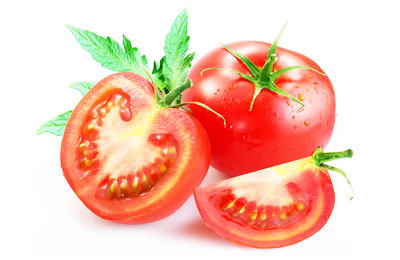
Lycopene, which is a carotinoid present in tomatoes and gives them their red colour, has antioxidant and anticancer properties. As an antioxidant, lycopene is able to protect cells against oxidation processes that cause DNA damage and can reduce the risk of cardiovascular diseases. It has been found that lycopene can also protect against various types of cancer (large intestine, prostate, breast, uterus, lungs, pancreas). Research shows that regarding prostate cancer more efficient are the combination of tomato and broccoli (even cooked) and inclusion or tomatoes (or other lycopene-containing products such as apricot, grapefruit, melon) and green tea in a meal. Lycopene is also efficient in reducing cardiovascular risks.
Scientists have discovered that the ability of tomatoes to prevent prostate cancer and cardiovascular diseases does not depend merely on their lycopene content, but also on the synergy with other biologically active substances available in tomatoes (beta-carotene, flavonoids, quercetin, polyphenols, and other) which makes these vegetables truly healthy products.
Tomatoes also contain other valuable antioxidants – vitamin C (100 g of tomatoes contain 20% of the daily vitamin C allowance for an adult) and beta carotene. These antioxidants neutralise the free radicals which may damage cells and cell membranes and thus cause inflammatory diseases (atherosclerosis, diabetic complications, asthma). Furthermore, tomatoes also contain fibrous matter which lowers cholesterol levels, regulates sugar content in blood, and helps prevent large intestine cancer.
The risk of atherosclerosis is also reduced by calcium and Group B vitamins (B3, B6, folates) available in tomatoes. Vitamin B3 regulates cholesterol levels, potassium has positive effects in lowering high blood pressure, and thus they reduce the risk of cardiovascular diseases.
Tomato juice may reduce blood clotting tendency. This is of particular importance in diabetes when blood vessel walls are damaged by the adhering thrombocytes („foam cells” in which cholesterol precipitates) and may result in cardiovascular diseases, stroke. Tomato juice is also recommended for people with a high risk of thrombi formation, i.e., in the post-operative period or in patients suffering from cardiovascular conditions and smokers. However, it should be taken into account that many industrially produced tomato juices have high salt content which is not good for arteries because it facilitates increase of blood pressure.
Tomatoes are a good source of vitamin K (100 g of tomatoes contain 11 % of the daily vitamin K allowance). Vitamin K assists absorption of calcium in bones.
Author: Associate Professor Ingrida Millere, Latvian University of Agriculture




